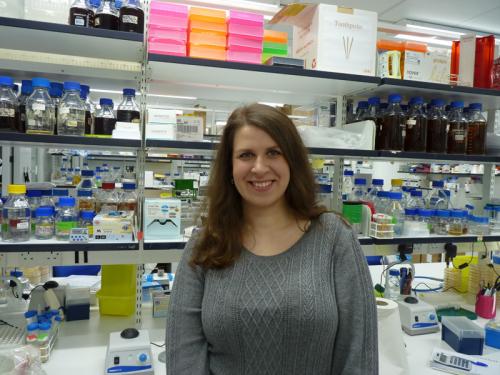
Marija Maric Awarded the 2014 Howard Elder Prize for Cancer Research
Marija Maric, who just completed her PhD studies in Karim Labib's group, has received the 2014 Howard Elder Prize for her discovery that the end of chromosome replication is regulated by ubiquitylation. Marija's award-winning PhD work was supported by Cancer Research U.K. and the MRC, leading to the publication of a research article in Science last October.
The DNA helicase that controls the progression of eukaryotic DNA replication forks is regulated in a highly sophisticated fashion, to ensure that cells can only produce a single copy of each chromosome per cell cycle. Helicase assembly during the initiation of chromosome replication is driven by two protein kinases that phosphorylate conserved assembly factors, but until now very little was known about the opposite process by which the helicase is disassembled at the end of DNA replication. Marija showed that the DNA helicase in budding yeast is specifically ubiquitylated on one of its 11 subunits, leading to a disassembly reaction that requires the Cdc48/p97 segregase. This work is a major step forward for the chromosome replication field and raises many questions for future studies in the coming years. At present it is not known how ubiquitylation of the helicase is restricted to the final stages of chromosome replication. Reconstitution of the disassembly process will also be a major challenge for the future, in order to elucidate each step of the mechanism. Finally it will be of great interest to identify the ubiquitin ligase that might regulate the DNA helicase in human cells, to see whether inhibition of this ligase might selectively kill cancer cells.
The Howard Elder Prize was endowed by Dr Alison Burt 25 years ago, in memory of her father Dr Howard Elder, who was a former medical graduate of the University of Dundee. The prize is awarded to a PhD or postdoctoral researcher who is deemed to have published the most significant paper in an area related to cancer research. Marija will remain in Karim's group at the MRC PPU until the summer of 2015, before leaving to start her postdoctoral work.
Marija is the 5th MRC-PPU researcher to be awarded the Howard Elder prize. The previous awardees were Xu Huang 2008, Elton Zeqiraj 2009, Craig MacKay 2010 and Kumara Dissanayake 2011.
The DNA helicase that controls the progression of eukaryotic DNA replication forks is regulated in a highly sophisticated fashion, to ensure that cells can only produce a single copy of each chromosome per cell cycle. Helicase assembly during the initiation of chromosome replication is driven by two protein kinases that phosphorylate conserved assembly factors, but until now very little was known about the opposite process by which the helicase is disassembled at the end of DNA replication. Marija showed that the DNA helicase in budding yeast is specifically ubiquitylated on one of its 11 subunits, leading to a disassembly reaction that requires the Cdc48/p97 segregase. This work is a major step forward for the chromosome replication field and raises many questions for future studies in the coming years. At present it is not known how ubiquitylation of the helicase is restricted to the final stages of chromosome replication. Reconstitution of the disassembly process will also be a major challenge for the future, in order to elucidate each step of the mechanism. Finally it will be of great interest to identify the ubiquitin ligase that might regulate the DNA helicase in human cells, to see whether inhibition of this ligase might selectively kill cancer cells.
The Howard Elder Prize was endowed by Dr Alison Burt 25 years ago, in memory of her father Dr Howard Elder, who was a former medical graduate of the University of Dundee. The prize is awarded to a PhD or postdoctoral researcher who is deemed to have published the most significant paper in an area related to cancer research. Marija will remain in Karim's group at the MRC PPU until the summer of 2015, before leaving to start her postdoctoral work.
Marija is the 5th MRC-PPU researcher to be awarded the Howard Elder prize. The previous awardees were Xu Huang 2008, Elton Zeqiraj 2009, Craig MacKay 2010 and Kumara Dissanayake 2011.

